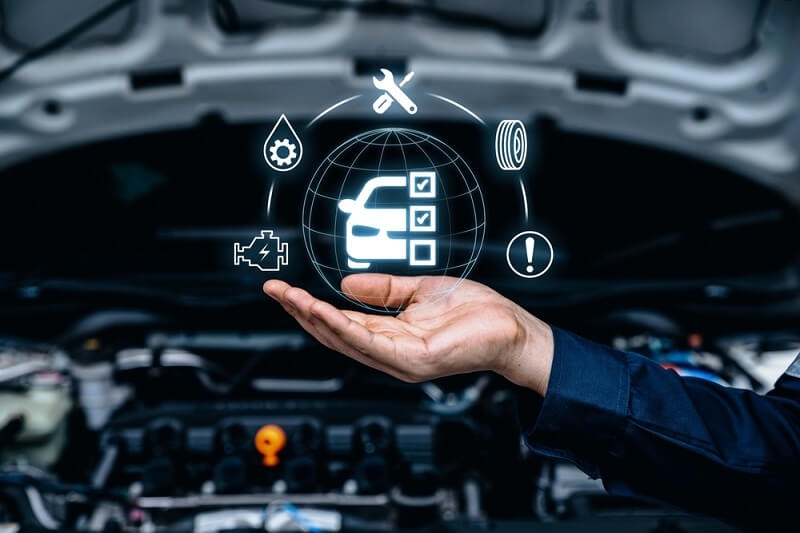
Searching for your first car is exciting, even if it's brand new from the lot or a used model that's only been driven for a few hundred miles. But besides just moving it, owning a vehicle comes with a responsibility. Caring for your vehicle is essential not only for extending the life of your car but also for your safety and potential cost savings if preventative maintenance is followed correctly. That is why this guide to vehicle care features the top 10 maintenance tips that a new vehicle owner should follow.
Even if you're just getting started, this car care checklist can help you establish a good foundation of knowledge about caring for your car. You will learn when and how to build an oil change schedule, when to check your tires, and how to avoid all the issues you will encounter if you do not keep up with these preventative maintenance items that could leave you stranded. Here is everything you need to know to make your car feel new!
Your car's owner's manual isn't just a glovebox filler—it's your first beginner auto care bible. It tells you when the manufacturer recommends you service your car, which is essential for everything from oil changes and air filters to tire rotations, brake pads, fluids, etc.
Pro Tip: Use your phone to remind you of the mileage/service intervals indicated in the owner's manual so you can remain on schedule.
The most essential car maintenance tip is to maintain an oil change schedule. Clean oil cleans and lubricates the internal engine, dissipates heat from the engine, and prevents wear.
Pro Tip: Always check your oil levels and color (suggest every month). It is time to change it if it is dark and/or gritty, even if you are not at the mileage.
Your tires are the only thing touching the road, so their condition matters. Keep the proper air pressure in them, rotate them every 5,000 to 8,000 miles, and inspect them for health.
Pro Tip: Learn how to check your tire tread using a penny—if Lincoln's head disappears, you are in good shape.

A well-maintained car needs more than oil. There are five key fluids to monitor:
Low or dirty fluids can lead to expensive repairs or dangerous driving conditions.
Pro Tip: Look for puddles or drips where you park—they may signal a leak.
Your car has two primary air filters: the engine air filter and the cabin air filter. Both are essential for optimal performance and air quality.
Every 12,000 to 15,000 miles, or as recommended in your manual
Pro Tip: Replacing filters is often a quick DIY task. Check YouTube or your owner's manual for simple instructions.
No one wants to be stuck with a dead battery. Please prevent this by checking and maintaining your battery regularly.
Pro Tip: Replace your battery every 3 to 5 years, even if it works fine.
Your car’s brake system is its most vital safety feature. New vehicle owners should regularly inspect the brake pads, rotors, and fluid.
Pro Tip: Don't ignore odd sounds or feelings when braking—it could save your life.
Modern cars come equipped with smart sensors that detect when things go wrong. Ignoring these warning lights can be a costly mistake.
Pro Tip: A blinking check engine light is more urgent than a steady one—get it checked immediately.
Regularly washing and detailing your car might seem cosmetic, but it plays a bigger role in maintenance than most realize.
Pro Tip: Wash your car every two weeks and wax every few months for optimal protection.
Even with diligent beginner auto care, a certified mechanic can catch issues you might miss.
Pro Tip: Build a relationship with a local mechanic or dealership service center you trust—it’ll pay off when problems arise.
Staying organized is half the battle in maintaining your car. Use this simplified car care checklist to track your routine:
| Maintenance Item | Frequency |
| Oil Change | Every 3,000–7,500 miles |
| Tire Pressure Check | Monthly |
| Tire Rotation | Every 5,000–8,000 miles |
| Fluid Levels Check | Monthly |
| Brake Inspection | Every 6 months |
| Battery Test | Annually |
| Air Filter Replacement | Every 12,000–15,000 miles |
| Car Wash | Bi-weekly |
| Full Detailing | Quarterly |
| Professional Inspection | Yearly |
Car upkeep doesn’t have to be intimidating. These 10 car maintenance tips every new vehicle owner should follow will undoubtedly get you started, and you'll feel good doing so from day one. Whether it is how often you should perform an oil change, check your tires, or clean your car, just a small habit can equal significant savings—and safer driving!
After we go through these vehicle maintenance guidelines, you’ll be equipped to do more than keep your car lasting longer; you’ll be able to protect your finances and, hopefully, your sanity! Just remember to be proactive and stay informed so you can hit the road confidently.
This content was created by AI